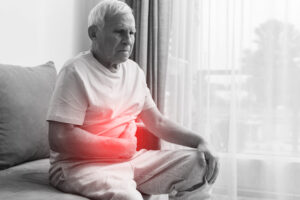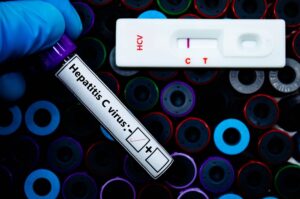
Signs of Stomach Ulcers
Stomach ulcers are open sores that develop on the lining of the stomach or small intestine, but heartburn is caused when stomach acid flows back into the esophagus.

The constant pain and embarrassment that can come with untreated irritable bowel syndrome (IBS) is something that most wants to put behind them. It is critically important to understand how bad IBS can become if it is left untreated. First, it is necessary to understand what this ailment is.
It is a misconception to think of irritable bowel syndrome as a single issue that one faces. Instead, IBS is a collection of symptoms and issues that one might face with something like this. The National Institute of Diabetes and Digestive and Kidney Diseases defines IBS in the following way:
Irritable bowel syndrome (IBS) is a group of symptoms that occur together, including repeated pain in your abdomen and changes in your bowel movements, which may be diarrhea, constipation, or both. With IBS, you have these symptoms without any visible signs of damage or disease in your digestive tract.
Take control of IBS symptoms early to prevent worsening discomfort and complications. The only way to actually feel better is to start to treat the cause of the problem.
There are long-term consequences to leaving IBS untreated. One of the most significant things that you might notice related to untreated IBS is that you are not able to break away from the symptoms related to this ailment. You are always going to have to deal with the fallout from having IBS in the first place. On top of that, you will likely face huge medical bills for not treating this more effectively and more quickly.
If you suffer from other diseases and/or ailments, then you might find that you have only made the situation related to those issues even worse. IBS can contribute to worsening symptoms of other issues. You don’t want to deal with the compounding dominos that leaving IBS untreated can create for you.
There is no question that IBS will get worse if left untreated. Those who have left their IBS untreated might think that they can get away with it. They might think that things will naturally improve on their own, or they might even feel that they simply don’t have the resources to treat IBS right now. However, the problem with this kind of thinking is that untreated IBS will compound the problem of not having enough resources. The circumstances will only get worse for you, and it will create even more expensive treatment options.
You should try to receive medical treatment for your IBS symptoms as soon as you realize it. You don’t want to put yourself in a situation where you disregard those symptoms and pretend that they are something else. That is the kind of thing that many people attempt to pull off. They feel that they can ignore the problem and that it will hopefully just go away. That said, it won’t work out that way. Take care of the problem right away.
The long-term consequences of untreated Irritable Bowel Syndrome range from physical to psychological. Some of the physical symptoms that might emerge from untreated Irritable Bowel Syndrome include the following:
These are just the physical symptoms that you might face when dealing with untreated Irritable Bowel Syndrome. There are also mental health concerns related to untreated Irritable Bowel Syndrome as well.
Some of the mental health issues that you might face when dealing with untreated IBS include:
These are only a couple of potential mental health consequences of untreated IBS. There are many others as well, and it is too big of a risk to take.
IBS is far more serious than it might seem on the surface. Much of our society pushes this aside or pretends that it is not a problem that they will ever encounter. However, the modern Western diet has made it far more likely that people will develop issues with IBS. Be mindful of this and of other risk factors that could put you in more danger of developing IBS. You will want to keep it under control so that you can avoid the consequences of untreated IBS.

Stomach ulcers are open sores that develop on the lining of the stomach or small intestine, but heartburn is caused when stomach acid flows back into the esophagus.

Poorly absorbed carbs may ferment in the gut, leading to symptoms such as bloating, gas, diarrhea, or constipation.

If left untreated, GERD can lead to complications including esophagitis (inflammation of the esophagus), strictures (narrowing of the esophagus), or even Barrett’s esophagus, a condition that increases the risk of esophageal cancer.

IBS-C often requires a tailored approach that incorporates dietary changes, stress management, and sometimes prescribed medications to regulate bowel movements and reduce discomfort.

Hepatitis C can affect women differently due to hormonal variations, immune system responses, and unique physiological factors

This connection means that stress, anxiety, and other psychological factors can directly impact gut function, leading to symptoms like abdominal pain, bloating, and irregular bowel movements.

Chronic inflammation associated with IBD can lead to complications such as joint pain, skin conditions, eye issues, and more.

How different types of fiber affect IBS is crucial to creating a diet that supports digestive health without triggering flare-ups.

Lactose Intolerance occurs due to a deficiency of lactase, the enzyme responsible for digesting lactose in the small intestine.

This condition can result from various factors, including poor diet, stress, infections, or underlying health conditions like IBD.

One of the most essential steps in managing IBS is identifying specific triggers and paying attention to your body’s unique responses.

Although the symptoms of IBS can vary widely from person to person, several common signs are associated with the condition.
For Your Visit
Brick Office
P: 732-458-8300
Brick Medical Arts Building
1640 Route 88, Suite 202
Brick, New Jersey 08724
Mon – Fri: 8:30AM – 5:00PM
Sat & Sun: Closed
Neptune Office
P: 732-776-9300
Jersey Shore Medical Arts Building
1944 Corlies Ave. Suite 205
Neptune, New Jersey 07753
Mon – Fri: 8:30AM – 5:00PM
Sat & Sun: Closed
Jackson Office
P: 732-928-2300
706 Bennetts Mills Road
Jackson, New Jersey 08527
Mon – Fri: 8:30AM – 5:00PM
Sat & Sun: Closed
© All Rights Reserved